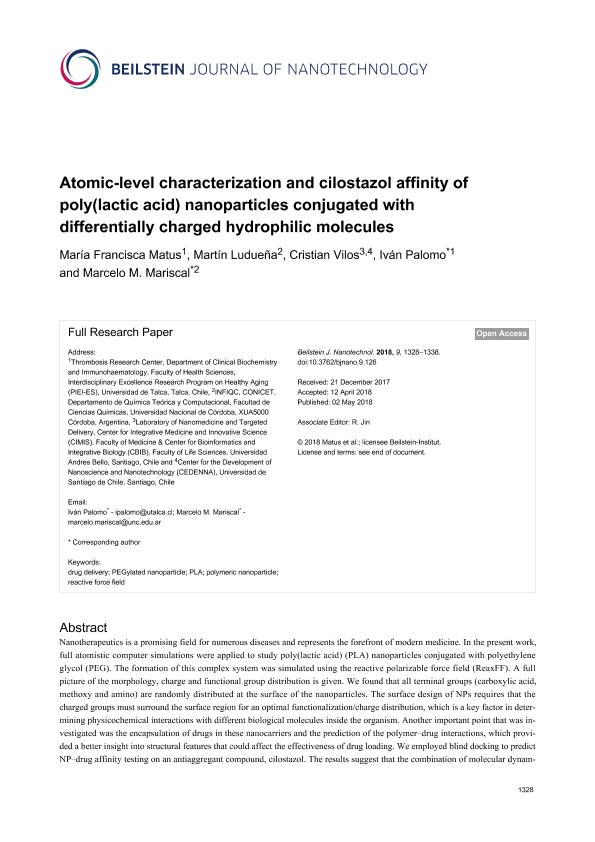Artículo
Atomic-level characterization and cilostazol affinity of poly(lactic acid) nanoparticles conjugated with differentially charged hydrophilic molecules
Fecha de publicación:
05/2018
Editorial:
Beilstein-Institut Zur Forderung der Chemischen Wissenschaften
Revista:
Beilstein Journal of Nanotechnology
ISSN:
2190-4286
e-ISSN:
2190-4286
Idioma:
Inglés
Tipo de recurso:
Artículo publicado
Clasificación temática:
Resumen
Nanotherapeutics is a promising field for numerous diseases and represents the forefront of modern medicine. In the present work, full atomistic computer simulations were applied to study poly(lactic acid) (PLA) nanoparticles conjugated with polyethylene glycol (PEG). The formation of this complex system was simulated using the reactive polarizable force field (ReaxFF). A full picture of the morphology, charge and functional group distribution is given. We found that all terminal groups (carboxylic acid, methoxy and amino) are randomly distributed at the surface of the nanoparticles. The surface design of NPs requires that the charged groups must surround the surface region for an optimal functionalization/charge distribution, which is a key factor in determining physicochemical interactions with different biological molecules inside the organism. Another important point that was investigated was the encapsulation of drugs in these nanocarriers and the prediction of the polymer-drug interactions, which provided a better insight into structural features that could affect the effectiveness of drug loading. We employed blind docking to predict NP-drug affinity testing on an antiaggregant compound, cilostazol. The results suggest that the combination of molecular dynam ics ReaxFF simulations and blind docking techniques can be used as an explorative tool prior to experiments, which is useful for rational design of new drug delivery systems.
Archivos asociados
Licencia
Identificadores
Colecciones
Articulos(INFIQC)
Articulos de INST.DE INVESTIGACIONES EN FISICO- QUIMICA DE CORDOBA
Articulos de INST.DE INVESTIGACIONES EN FISICO- QUIMICA DE CORDOBA
Citación
Matus, María Francisca; Ludueña, Martin; Vilos, Cristian; Palomo, Iván; Mariscal, Marcelo; Atomic-level characterization and cilostazol affinity of poly(lactic acid) nanoparticles conjugated with differentially charged hydrophilic molecules; Beilstein-Institut Zur Forderung der Chemischen Wissenschaften; Beilstein Journal of Nanotechnology; 9; 1; 5-2018; 1328-1338
Compartir
Altmétricas




